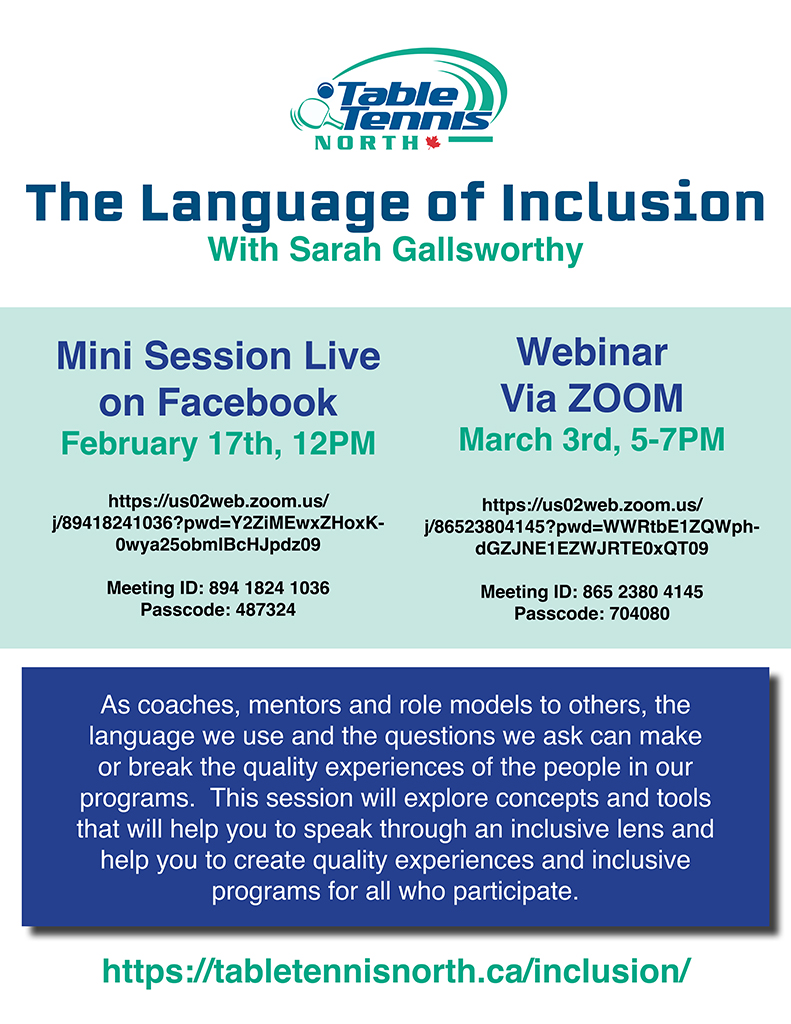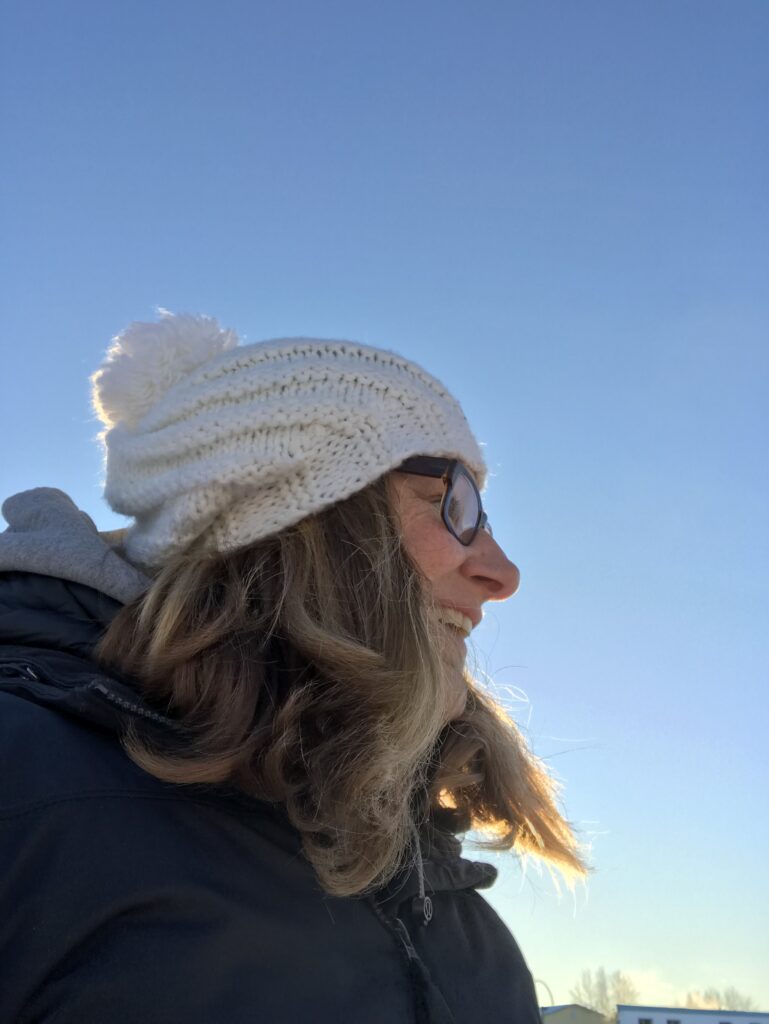Sport is not an equal playing field, it is a sex-segregated world, where not everyone belongs and is welcomed. Sport is however, one of the most powerful platforms for promoting equality and empowering all who participate. One of the ways we can start moving towards equality in sport is with the language we use. This is our commitment to everyone.
Table Tennis North is making a proactive commitment to using inclusive language in all its communication. Whenever anyone is wearing the Table Tennis North logo, they are representing the organizations and are committed in creating a safe and inclusive sport experience for all.
Table Tennis North will do this by:
· Using inclusive language in all communication.
· An on-going commitment to supporting and educating on the use of gender pronouns.
· Using inclusive language in all videos and in the virtual environment.
· Creating safe and inclusive spaces.
Gender pronouns (he/she/they/ze etc.) specifically refer to the person you are address. Pronouns are a part of someone’s gender expression and send the message to others of who they authentically are and how they feel about themselves.
Many non-binary people feel left out of society and often have their pronouns ignored, misused, or discounted. Non-binary or genderqueer are umbrella terms for gender identities that are neither male or female, boy or girl.
Below are a few links that can help you practice using other pronouns:
http://mypronouns.org/she
http://mypronouns.org/he
http://mypronouns.org/they
http://mypronouns.org/ze
http://mypronouns.org/neopronouns
Safe and Helpful Hints:
· Don’t guess – Ask. It is acceptable to ask someone what pronoun they use.
· Use singular “they/them/theirs” for a person until you have the opportunity to ask about their pronouns.
· You can also use their name until you learn their pronouns.
· If you have trouble remembering someone’s pronoun, it is okay to ask for a reminder.
· If you misuse someone’s pronouns, acknowledge that you have done that and move on. The best way to show that you care is to try to use the correct pronoun.
Tips for programs and practices:
· Offer a non-binary gender option for membership registration.
· Update registration forms, and online forms, to include the gender pronouns that individuals use.
· Avoid referring to a group or team with “hey guys” or “hey girls”. Use gender neutral language like ‘hey team’ or “hey everyone”.
· Start sharing your pronouns to normalize the behavior of not making assumptions about gender identity. You can start by adding your pronouns to your email signature: Thorsten Gohl, Executive Director (he/him/il/lui)
As coaches, mentors and role models to others, the language we use and the questions we ask can make or break the quality experiences of the people in our programs. This session will explore concepts and tools that will help you to speak through an inclusive lens and help you to create quality experiences and inclusive programs for all who participate.
| What to no longer say… | What to Consider using… |
| Suicides. This term is insensitive and can be harmful to people and communities. | Folks. Humans. Athletes. People. Friends. Y’All *Introduce yourself using your pronouns can help non-binary people feel safe and welcomed. Make sure to respect the person’s name and pronoun by using what they ask you to use. If you make a mistake, apologize, and move on. The best way to |
| Handicapped. Retarded. Special. These terms can be triggering and harmful. | Person with an intellectual, cognitive, developmental, or learning disability Coaching Association of Canada |
| Insane. Crazy. Nuts. These terms can be triggering and harmful. | Person with an emotional or behavioural disability, person with a mental health or a psychiatric disability – Coaching Association of Canada |
| Confined to a wheelchair, crutches or any mobility aid and support. This can make an athlete feel less capable than those that do not use mobility aids. | Person who uses a wheelchair, cane or mobility aid. |
| “Man up” “You throw like a girl” “You run like a girl” “That’s Gay” “Boys don’t cry” “Grow some Balls” | These terms are often used to demine a person and to send the message that they are doing something badly. Interrupting this harmful and isolating language both on the playing fields and in the locker-room is critical in contributing to an inclusive sport experience. |
| Natives, Indians, Eskimo(s) | Indigenous Peoples First Nations, Métis, Inuk (Inuit is plural). |
| Reserve | Community or Home. |
| “My Spirit animal is definetley a sloth” “Let’s have a quick pow-wow” | The use of the term “spirit animal” in a non-Indigenous context (e.g., as a joke or to indicate one’s love for something/someone) is an offensive appropriation of Indigenous cultures and beliefs. Let’s have a quick pop-wow is commonly used to talk about having a meeting or get together, this is a cultural appropriation of a significant celebration by many Indigenous communities. Its non- Indigenous reference dilutes and disrespects its meaning and cultural significance. |
Safe Sport 101 – Inclusive Language Starts with You.
Non-Binary Inclusion in Sport
https://leapsports.org/files/4225-Non-Binary%20Inclusion%20in%20sport%20Booklet.pdf
Egale Canada – LGBTQI2S Sports Inclusion Toolkit Checklist
https://egale.ca/wp-content/uploads/2017/07/LGBTQI2S-Sports-Inclusion-Toolkit-Checklist-3.pdf
March 3rd at 5-7pm – Webinar via ZOOM
Zoom information:
https://us02web.zoom.us/j/86523804145?pwd=WWRtbE1ZQWphdGZJNE1EZWJRTE0xQT09Meeting ID: 865 2380 4145Passcode: 704080
February 17th at 12pm – Mini session live on Facebook
ZOOM information:
https://us02web.zoom.us/j/89418241036?pwd=Y2ZiMEwxZHoxK0wya25obmlBcHJpdz09Meeting ID: 894 1824 1036Passcode: 487324
Facebook live stream: https://www.facebook.com/tabletennisnorth

About Sarah
Sarah Gallsworthy (She/Her/Hers) is on a journey to share the power of movement, health and quality programming. Growing up in British Colombia she learned early about the value of active, healthy living. As part of the LGBTQI2S community, Sarah also understands that barriers to programs and spaces can limit potential. She is an advocate for awareness and inclusion to help others find a sense of belonging and acceptance. Sarah left the healthcare sector with a passion for teaching others. She is currently a professor in both the Fitness Health Promotion and Recreation Programs at Seneca College, in Ontario, a learning facilitator for the Coaching Association of Ontario, a Physical Literacy master learning facilitator with Sport for Life, a collaborator with INclusion INcorporated and a master trainer with High Five. As a sport and recreation consultant, Sarah has been a part of many Provincial, Territorial and National initiatives that support physical literacy, child development and quality engagement. When not working, you can likely find Sarah keeping active at her local park in her most important role of mum to young daughter Ayla, whilst tossing a frisbee ( that will never be returned) to Great Dane, Hamilton.
